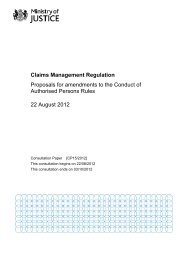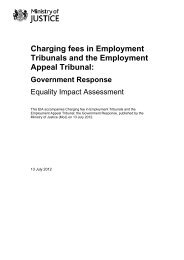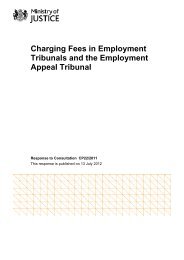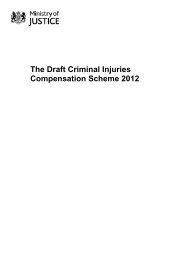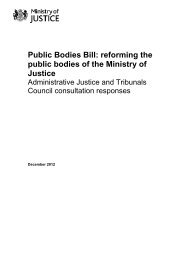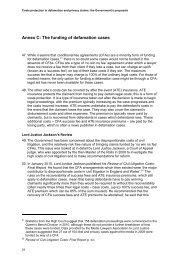Appointments and Diversity 'A Judiciary for the ... - Ministry of Justice
Appointments and Diversity 'A Judiciary for the ... - Ministry of Justice
Appointments and Diversity 'A Judiciary for the ... - Ministry of Justice
You also want an ePaper? Increase the reach of your titles
YUMPU automatically turns print PDFs into web optimized ePapers that Google loves.
<strong>Appointments</strong> <strong>and</strong> <strong>Diversity</strong> A <strong>Judiciary</strong> <strong>for</strong> <strong>the</strong> 21st Century’<br />
Response to public consultation<br />
An odd number <strong>of</strong> members would avoid any need <strong>for</strong> a casting vote (which gives<br />
more weight to <strong>the</strong> views <strong>of</strong> one individual).<br />
Paragraph 147, 25th Report <strong>of</strong> Session 2010–12, Judicial <strong>Appointments</strong><br />
40. There<strong>for</strong>e, selection commissions <strong>and</strong> panels <strong>for</strong> <strong>the</strong>se roles will be comprised<br />
<strong>of</strong> an odd number <strong>and</strong> a minimum <strong>of</strong> five members so that <strong>the</strong> Chair does not<br />
have a casting vote.<br />
Question 5: Should <strong>the</strong> Lord Chief <strong>Justice</strong> chair selection panels <strong>for</strong> Heads <strong>of</strong><br />
Division appointments in Engl<strong>and</strong> <strong>and</strong> Wales (S71 CRA 2005)<br />
41. Overall <strong>the</strong>re were 25 responses submitted in relation to this question. Of those, <strong>the</strong>re<br />
were 22 responses that were <strong>for</strong> <strong>the</strong> proposal; while only three did not support <strong>the</strong><br />
change.<br />
42. Those who were in favour <strong>of</strong> our proposals highlighted <strong>the</strong> nature <strong>of</strong> <strong>the</strong> role <strong>of</strong> Heads<br />
<strong>of</strong> Division, both in terms <strong>of</strong> providing appropriate leadership <strong>and</strong> undertaking senior<br />
judicial <strong>of</strong>fice, <strong>and</strong> that given <strong>the</strong> vital working relationship between <strong>the</strong> Lord Chief<br />
<strong>Justice</strong> <strong>and</strong> <strong>the</strong> Heads <strong>of</strong> Division, <strong>the</strong> Lord Chief <strong>Justice</strong> was <strong>the</strong> most appropriate<br />
person to chair <strong>the</strong> selection panel.<br />
43. Of those who did not support <strong>the</strong> proposal, some highlighted <strong>the</strong> level <strong>of</strong> impartiality<br />
that <strong>the</strong> current process provides, with a Supreme Court judge providing an<br />
independent perspective <strong>and</strong> less likely to appoint in <strong>the</strong>ir own image.<br />
44. An important aspect <strong>of</strong> our proposals relates to selection panel composition <strong>and</strong> it is<br />
important to strike <strong>the</strong> appropriate balance between judicial <strong>and</strong> lay input in to <strong>the</strong><br />
selection panels. For <strong>the</strong> selection <strong>for</strong> appointment as Heads <strong>of</strong> Division, we consider<br />
that a judicial chair is appropriate <strong>and</strong> <strong>the</strong>re<strong>for</strong>e <strong>the</strong> Lord Chief <strong>Justice</strong> is in <strong>the</strong> best<br />
position to determine <strong>the</strong> leadership <strong>and</strong> judicial skills required <strong>for</strong> <strong>the</strong>se <strong>of</strong>fices.<br />
There<strong>for</strong>e <strong>the</strong> selection panel <strong>for</strong> Heads <strong>of</strong> Division will be chaired by <strong>the</strong> Lord<br />
Chief <strong>Justice</strong>.<br />
45. We accept that <strong>the</strong>re is a concern that with <strong>the</strong> Lord Chief <strong>Justice</strong> chairing <strong>the</strong><br />
selection panel <strong>the</strong>re might be a perception <strong>of</strong> too little lay member influence on <strong>the</strong><br />
selection panel. However, we are <strong>of</strong> <strong>the</strong> view that through <strong>the</strong> inclusion <strong>of</strong> at least two<br />
lay members on <strong>the</strong> selection panel that any concerns can be mitigated.<br />
46. The composition <strong>of</strong> <strong>the</strong> selection panel will have five members, where two are judicial<br />
with at least two <strong>of</strong> <strong>the</strong> remaining three members being lay members. We also<br />
believe that <strong>the</strong>re should always be a gender <strong>and</strong>, where possible, an ethnic mix on<br />
<strong>the</strong> selection panel.<br />
Question 6: Should only one serving judge <strong>of</strong> <strong>the</strong> Supreme Court be present on<br />
selection commissions, with <strong>the</strong> second judge replaced with a judge from<br />
Scotl<strong>and</strong>, Nor<strong>the</strong>rn Irel<strong>and</strong> or Engl<strong>and</strong> <strong>and</strong> Wales (Schedule 8, pt1 to <strong>the</strong> CRA<br />
2005)<br />
47. Overall <strong>the</strong>re were 32 responses submitted in relation to this question. Of those, <strong>the</strong>re<br />
were 21 responses that were <strong>for</strong> <strong>the</strong> proposal; while 11 did not advocate <strong>the</strong><br />
proposed change.<br />
13



